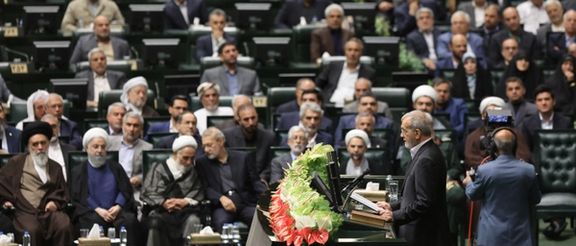Tehran media outline Pezeshkian's challenges soon after inauguration

Before his swearing-in ceremony on Tuesday, media in Tehran were warning President Masoud Pezeshkian of the legislative and financial challenges he will soon face.

Before his swearing-in ceremony on Tuesday, media in Tehran were warning President Masoud Pezeshkian of the legislative and financial challenges he will soon face.
On Monday, the Reformist-aligned Etemad newspaper reminded readers that academic Bijan Abdolkarimi and Reform Front head Azar Mansouri have previously stated that Pezeshkian is Iran's last chance to address its longstanding financial, cultural, and foreign policy issues and to correct the direction of governance in Iran.
Etemad further quoted a conservative politician, noting that anyone else elected president instead of Pezeshkian would also be seen as Iran's last chance to resolve its multiple crises.
The newspaper emphasized that Pezeshkian's most pressing challenges include addressing the concerns of the majority who boycotted the election and assuring voters that his promises to end social media filtering and bans, and the violent crackdown on women defying compulsory hijab will be seriously pursued.
However, Etemad pointed out that solving these issues is not entirely within the power of any Iranian president.
The daily added that tactics used by hardliners outside the government regarding the bills on social media and hijab could make Pezeshkian's job even more difficult. It also reminded readers that during his campaign, Pezeshkian "guaranteed to stand against the filtering and Morality Police." This brings Pezeshkian to a tough decision: whether to stand by his promises or to yield to the limitations of Iran's political structure.
One of Pezeshkian's staunch supporters, former Tehran Mayor Gholamhossein Karbaschi has stressed that lifting the ban on social media would be the new President's easiest job and as far as the nation is concerned a test of his reliability to stand by his promises.
The daily observed that solving Iran's foreign policy issues and returning to negotiations to revive the 2015 nuclear deal, thereby lifting sanctions and addressing the country's economic problems, will take much longer. While some US officials have occasionally mentioned negotiations with Iran, there is no indication that they are interested in the 2015 deal. Instead, the United States seeks a new comprehensive agreement that would address Iran's regional and international threats and military ambitions and bring its nuclear activities under international control in exchange for easing some sanctions.
Meanwhile, centrist website Entekhab probed into Pezeshkian's ability to confront the upcoming challenges posed by hardliners at the Iranian parliament (Majles) whose vote of confidence to Pezeshkian's cabinet ministers can finally end the saga of forming the new cabinet.
Entekhab wrote that while Pezeshkian is in a hurry to start his work as Iran's President, four conservative groups at the Majles will take their and Pezeshkian's time to review the ministers' credentials.
Despite Supreme Leader Ali Khamenei's call for a quick vote of confidence for the president's cabinet, It is unlikely that hardliners would give their vote of confidence to all the ministers without any hassle.
The first group to obstruct an easy vote of confidence are the neocon supporters of the Speaker Mohammad Bagher Ghalibaf. However, according to Entekhab, as their political behavior is not based on ideology, they might approve the ministers' credentials with minimal opposition.
The second group are moderate conservatives coming from various political groups. They have been supporting Pezeshkian during his campaign and they are not likely to create any problem. However, they form a very small fraction of the Majles.
Another group known as "moderates" who are in between the reformists and conservatives, will also support Pezeshkian. A fourth group, the members of the ultra-conservative Paydari, are the troublemakers. The votes given during the election of Speaker of the Majles showed that they are no more than 60 MPs. However,as many of them are avid politicians whose candidate Jalili lost the presidential election, they might be able to garner support from among other groups or the so-called "independents" to block the approval of one or more ministers.
In another report about Pezeshkian's challenges during his first weeks in office, Rouiydad24 website noted that there is a discrepancy between the Planning and Budget Organization Chief Davud Manzur and the outgoing Economy Minister Ehsan Khandouzi's assessment of the funds available at the treasury as the new government starts its work.
Khandouxzi has said that he will hand over the treasury to his successor with 185 billion rials while Manzur claims that government has 300 billion rials (around $500m) of funds in its treasury at the time of Pezeshkian's inauguration.
The report said that confusion and discrepancy about the extent of the government's debts to the banks and other organizations is another matter that is likely to cause problems for the new government. This comes while some observers and economists in Tehran say no government statistics are reliable.